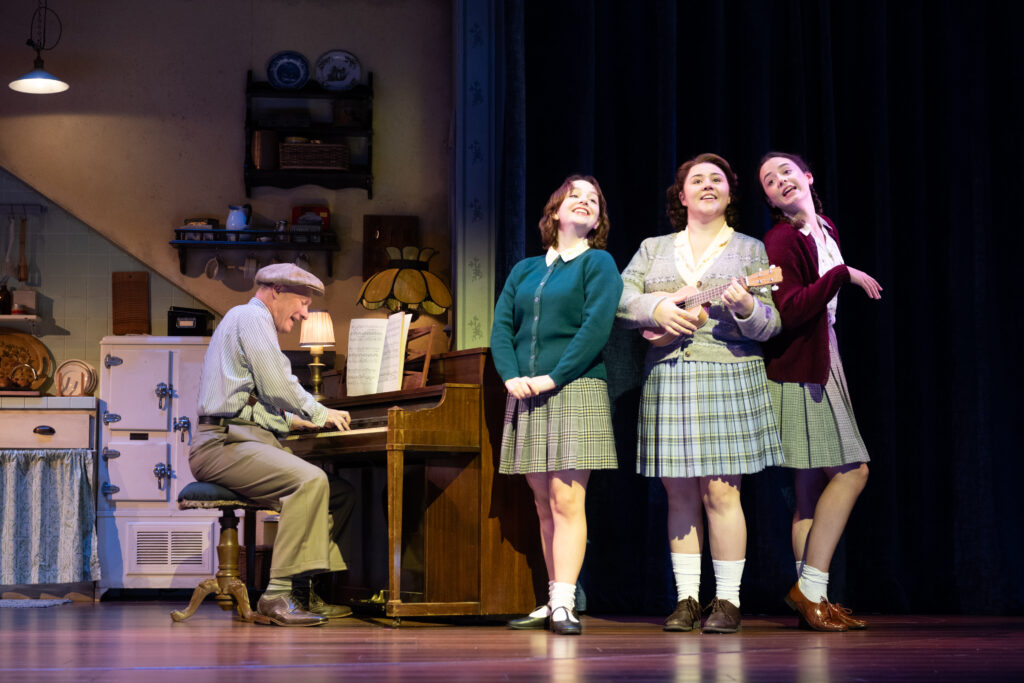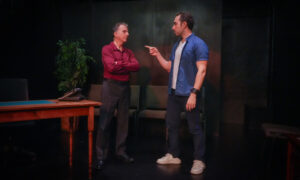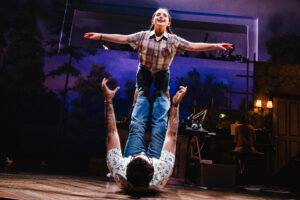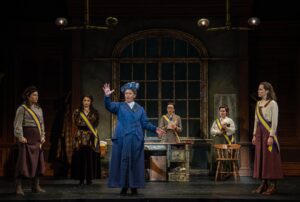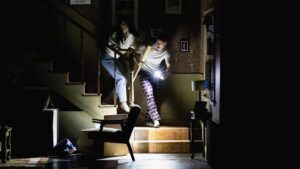The Hills of California, with their L.A. showbiz cachet, vaguely define the fierce dream of Veronica Webb (Allison Jean White), a Gypsyish mother in 1955 Blackpool, England, for her four daughters. But as ever, the dream harbors both a potential for betrayal and for the tedious, awkwardly shameful realities of its likely failure, revealed as the daughters gather for their mother’s death in 1976.
The Huntington production of Jez Butterworth’s very long play opens with a spectacular set by Andrew Boyce and Se Hyun Oh, earning enthusiastic audience applause before a single word is spoken. At ground level is the 50’s kitchen of a seaside rooming house, crammed with a huge jukebox and a thatched-roof tiki-style bar added in the hope to lure custom as the resort community is abandoned by tourists staying home to watch the latest thing – television. But climbing over two stories above the 1976 stage is an impossibly long and oddly threatening staircase, filling the entire proscenium arch. At the top is a darkened doorway, the far, right-side jamb alone illuminated at all times by Russell H. Champa’s deft lighting design.
Only the adult Jillian (Karen Killeen), the stay-at-home caregiver, still virginal and perhaps most stifled by Veronica’s dream, daughter, and the hospice nurse, Penny (Patrice Jean-Baptiste, also Biddy, the housekeeper in the 1955 scenes), ever actually climb and descend those looming 28 steps. Asthmatic daughter Ruby (Aimee Doherty) seems to have been up there before the action begins, angry, combative Gloria (Amanda Kristin Nichols) flatly refuses the climb, and bearer-of-the-ugly-secret Joan who fled to California (Allison Jean White), starts but can’t do it.
The massive set does 180 turns, alternating between 1976 and 1955, with a complicated ensemble cast including the young Webb sisters: (Young Ruby,Chloé Kolbenheyer; Young Gloria, Meghan Carey; Young Jillian, Nicole Mulready; Young Joan, Kate Fitzgerald), the adult sisters: two barely-seen and pointless husbands, Ruby’s husband (Kyle Cameron) and Mike Masters as Gloria’s husband, also playing Joe Fogg, and Dr. Rose and Cameron also playing Jack Larkin), and, I think, Jack Greenberg playing sullen teen son of Gloria and Bill, Tony, as well as Mr. Halliwell and Mr. Smith, while Lewis D. Wheeler plays Mr. Potts and the vile Luther St. John. Veronica’s determination to recreate the Andrews Sisters with her daughters, her inability to deal with changing times and tastes, is sad but, lacking backstory to explain it, makes her two-dimensional, a trope White nonetheless brilliantly molds. Scrupulously coached but often difficult to understand working-class British accents further obscure subtleties that might emerge in additional study of the play.
And the play is about subtleties. From the first scene, everyone knows where this often-told story is going. Desperate mama pushing daughter(s) toward her own dated and impossible dream? At a terrible cost? Is there a story if mama refuses the cost? Probably not. So we’re left with the echo of Young Joan alone with American producer St. John up in the somehow unwholesome “Mississippi Room” (the guest rooms are all named for U.S. states), singing her Nat King Cole favorite, “When I Fall In Love.” We watch as Veronica listens in the kitchen, the sweet young voice stops abruptly and innocence has yet again been sacrificed. Nothing new.
And yet the young sisters’ costumed rendition of “Boogie Woogie Bugle Boy of Company B” for St. John prior to Veronica’s damned and damning decision to send Joan up those stairs (that are barely seen in the 1955 set), is a delight. And so, after a wait consuming three-fourths of the play until she finally arrives, is Joan’s not-quite-tongue-in-cheek narrative of her twenty years in Los Angeles, the “Hills of California.” She goes to an agency and gets a job right away! Delivering pizza in a little yellow van. One night she delivers pizza to a mansion in the Hollywood Hills, to (here it comes . . .) a now 60-something Andrews Sister! Everybody gets drunk, Joan loses her job in result and tries but can never find the mansion again. The wash of dramatic irony and flat reality is another sort of delight.
In the end, despite medically-assisted death having never been legal in the UK, a doctor suggested by Penny in Act One is summoned, Veronica is dead and Joan slips quietly away into the night. The sisters have seemingly internalized and then stood outside the world of their mother long enough to bond, briefly, and then go on. But the image I will forever associate with The Hills of California is that threatening, empty staircase filling a whole stage. Nobody wants to climb those steps toward Whatever Happens Next. But everybody will.
The Hills of California by Jez Butterworth, directed by Loretta Greco in association with Berkeley Repertory Theatre. At the Huntington Theatre, 264 Huntington Avenue, Boston, MA, 02115, Friday, Sept. 12 – Sunday, Oct. 12, 2025. Tickets – 617 266-0800. huntingtontheatre.org

